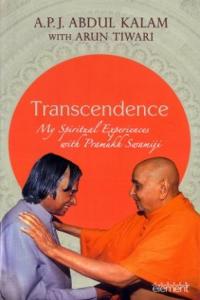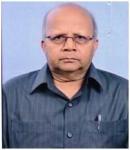Creation and Criticism
ISSN: 2455-9687
(A Quarterly International Peer-reviewed Refereed e-Journal
Devoted to English Language and Literature)
Vol. 01, Issue 03 : Oct 2016

Transcendence: My Spiritual Experiences with Pramukh Swamiji by A. P. J. Abdul Kalam
A. P. J. Abdul Kalam. Transcendence: My Spiritual Experiences with Pramukh Swamiji. New Delhi: Harper Collins, 2015. Pp. 256. Price: Rs. 294/- (Hardcover). ISBN:978-9351774051
Reviewed by Satish Kumar
Dr. A.P.J. Abdul Kalam, a renowned scientist, humanist, spiritualist, intellectual, rationalist, visionary, philosopher, thinker, teacher of teachers, poet, writer and former President of India, was a great and gifted prose writer whose Wings of Fire , Turning Points , Guiding Souls , India 2020—A Vision for the New Millennium, Ignited Minds and his last book Transcendence express his vision of a better and happier future for humanity, perennial spiritual wisdom and idealism of India, and his scientific temper and rationality in simple, clear, chaste, and poetically flowing language which electrifies both minds and hearts of readers . Transcendence: My Spiritual Experiences with Pramukh Swamiji is the spiritual manifestation, which he attained in the holy company of Pramukh Swamiji of the Swami Narain sect. In the Introduction, Dr. Kalam observes that he inherited spiritual temperament and Sarv Dharam Sadhav from his father, Pakshi Lakshmana Shastrigal, ‘the Vedic scholar and head priest of famous Rameswaram temple, Rev. Father Bodal, who built the first church on Rameswaram Island and my father who was the Imam in the mosque”(ix ). Time and again Dr. Kalam met the Pramukh Swamiji and had had discussions on religious and spiritual topics. In Swamiji he found a great God - intoxicated saint who gave a new direction to his life. In an emotionally and spiritually charged meeting Swamiji held my hand for ten minutes. No words were spoken. We looked into each other’s eyes in profound communication of consciousness. It was a great spiritual experience (xi – xii). Transcendence is dedicated to the “righteous people of the world wherever they are.”
Transcendence, written with Dr. Kalam’s fellow’s fellow scientist Dr Arun Tiwari, is divided into four parts, preceded by a Prologue and followed by an Epilogue. In the Prologue he reveals that on March 11, 2014 after meeting Swamiji he read a philosophical book The Book of Mirdad, he felt spiritually elevated and got the inspiration to write Transcendence with the idea of unifying the divisive tendencies prevailing in the world. The first part ‘Experiencing the Presence’ deals with self-purification and the sanctification of society. In it Kalam picturesquely describes his first meeting with Swamiji . He met Swamiji on June 30, 2001. It was an enlightening experience and Swamiji “resplendent in saffron robes … was radiating divinity” (3). He presented before him the vision of advanced India by 2020. Swamiji advised him to bring about transformation through spiritual awakening and emphasised the importance of non-attachment and performance of duty. He also highlighted the unique importance and the relevance of Srimad Bhagvadgita in modern life. Swamiji recognised the divine potential of Dr. Kalam. Swamiji maintained his calm when terrorists attacked Akshar Dham Temple in Gandhinagar, Gujrat. Peace is essential for progress. All religious places are the abode of peace. In his sacred company he felt how important children are in national progress. During his second visit to Akshar Dham in 2004 on the occasion of Suvarna Bal Mahotsav, Kalam felt the importance of value-based educational revolution on the consecration ceremony of Akshardham Temple. In November he met Swamiji in Delhi. He was deeply impressed by Swamiji’s perseverance. Dr. Kalam received the unique gift of being present with Pramukh Swamiji all the time. Summing up swamiji’s effect on him he writes: “He has indeed transformed me. He is the ultimate stage of the spiritual ascent in my life. ...I am placed in my final position in eternity” (50).
Part two: ‘Spirituality in Action’ is a glowing manifestation of Kalam’s spiritual attainments which he put into action for the welfare of humanity with the blessings of the Pramukh Swami of BAPS. He felt the presence of God in all places of worship – temple, mosque, church. ‘By sincere prayers devotees can only receive guidance.” Mahatma Gandhi, and Nelson Mandela were radiant examples of spirituality in action. In Part Three ‘Fusion of Science and Spirituality’, Kalam symbolically expresses “my spiritual oneness with PramukhSwamiji by exploring the essential oneness of science and spirituality” (114). He points out that the great scientists were deeply religious. Pythagoras, who influenced many a scientist, observed that everything in cosmos exists in a harmonious and orderly system. In the Eleventh chapter of the Bhagavad-Gita we come across the ‘the ancient cosmological concepts … expressed in language comprehensible to us without resorting to precarious interpretations.” This is the Vedic concept of the unity of science of spirituality. In Islamic scripture the universe “is similarly profound and arcane – and correspondingly poetic” (127). He quotes many scientists to prove the inherent unity between science and religion. The Swaminarain community is endeavouring to liberate human consciousness from exterior forces. Spirituality contributes to the creation of ideas. Knowledge is formed by the union of understanding and experience.
‘Part Four: Evolution of Creative Leadership’ delineates the qualities of creative leader who is truthful and fearless. Defining fearlessness, Kalam quotes from Atharva Veda, “May we be fearless from friends and enemies, from known and unknown. From night and day, may all the directions be our allies (176). To him Pramukh Swamiji is a perfect example of an accomplished leader. He is Gunatit. A true leader never abandons the path of truth. A leader transforms others. He gives examples of many great leaders of world. In Swamiji’s presence he has “realized the transforming power of one’s pious conduct upon others. Swamiji seldom gives orders .He doesn’t command, argue, reprimand or persuade. He lives immersed in Divine” (183). Simplicity, patience, and compassion are also three attributes of a leade. Transcendence, written is simple, austere, chaste, lucid and poetical style, is Dr. Kalam’s spiritual autobiography which evinces the ineffaceable influence of Vedic Dharma , Islam , Christianity , world’s great philosophers and thinkers on Dr. Kalam of enlightenment. Pramukh Swamiji of BAPS was a great spiritual leader who “has unified all our energies to regenerate and restore life from the rubble of damage.” His transforming influence strengthened Kalam’s moral and spiritual fibre. The beauty of its aphoristic expressions – ‘a country without a vision has no future, ‘a temple is the visible manifestation of the Divine’, science without religion is lame, religion without science is blind,” this energy is the central engine of our life’, ‘understanding and experience can work together to form understanding’, ‘Through hope we reinvigorate ourselves and inspire others’ is unsurpassable. Being a poet at heart he deftly uses poetic expressions, as – ‘You are in eternity. It is time untimed and space unspaced. “I opened my eyes and saw the morning star shining above the Arjuna tree, as a crowning jewel, in the fleeting hours of night.” By virtue of originality of thought and beauty of style, Transcendence has an abiding place in Indian English literature. Dr A.P.J. Abdul Kalam emerges as a great prose writer.
The Reviewer:
 Prof. Satish Kumar retired from UP Government Higher Education Service Class I. He worked as Professor and Head in three Government Colleges while he had been the Principal of five Government Colleges. He has authored a number of books including Edgar Allen Poe: Style and Structure of His Short Stories,Literary Explorations, and his four volumes on Indian Writing in English, namely,A Survey of Indian English Prose, A Survey of Indian English Poetry, A Survey of Indian English Drama and A Survey of Indian English Novel. He had been the former Dean, Faculty of Arts, MJP Rohilkhand University, Bareilly. He can be contacted at drsatishkumar08@gmail.com.
Prof. Satish Kumar retired from UP Government Higher Education Service Class I. He worked as Professor and Head in three Government Colleges while he had been the Principal of five Government Colleges. He has authored a number of books including Edgar Allen Poe: Style and Structure of His Short Stories,Literary Explorations, and his four volumes on Indian Writing in English, namely,A Survey of Indian English Prose, A Survey of Indian English Poetry, A Survey of Indian English Drama and A Survey of Indian English Novel. He had been the former Dean, Faculty of Arts, MJP Rohilkhand University, Bareilly. He can be contacted at drsatishkumar08@gmail.com.


